Canaris, Wilhelm Franz (1887-1945), Admiral, Germany - head of the Abwehr, German armed forces intelligence, from 1935 to 1944; was an important though enigmatic member of the 'Junker' resistance to Hitler; from a wealthy and well-established military background, entered the Navy as a cadet in 1905 and saw service on the cruiser Dresden at the Battle of the Falklands during World War I; his success in escaping internment after the scuttling of his ship and making his way back to Germany through British controls brought him to the attention of German military intelligence; in 1934 succeeded Conrad Patzig as head of the Abwehr, then a small though important department which grew significantly once the war began; a complex and private personality, his motives for his rejection of Nazism have been attributed to the general and partisan attitude of his class towards National Socialism and its consequences for Germany, rather that to moral objections fo national policy, though this may be an unfair interpretation of his commitment to the resistance movement in Germany; in 1938 had become involved in the formation of a nucleus of active conspiracy which also included senior army members Beck, Halder and von Kleist; after the invasion of Poland, warnings of the possibility of invasion by German forces were passed to the Netherlands, Denmark, Belgium and Norway, probably through not conclusively originating from Canaris; as the war progressed, the Abwehr played a central role in recruitment to the resistance, and provided liaison between civilian and military opponents of the regime, though it was increasingly ovelooked by antagonistic SS and Gestapo chiefs who saw the Abwehr as a direct challenge to their own power and influence; afforded the vital cover of Canaris's authority, Abwehr's second-in-command, General Hans Oster, nevertheless successfully recruited ment like Bonhöffer, Dohnanyi and Josef Müller,as well as making contacts with ministerial officials, the Army High Command and even the Gestapo and SS; but the risks of resistance, however concealed by the normal functioning of the intelligence service, were bound to increase; early in April 1943, the Gestapo occupied General Oster's department and arrested his most important collaborators; although Canaris succeeded in avoiding a trial and temporarily covering his own tracks, the suspicious surveillance of the rival SS and Gestapo rendered the Abwehr resistance largely ineffective; the 1944 attempt of Hitler's life, in which Canaris was not directly involved, nevertheless sealed his fate; the dictator's close escape at Rastenberg made him ruthless to subordinates whose commitment was anything but fanatical; among hundreds of others with no direce connection with von Stauffenberg's bomb plot, Canaris was arrested, tried for treachery and imprisoned; transferred to a series of camps and prisons, the former Abwehr chief was executed at Flossenberg in a final, futile act of SS vengeance, in the last days of the war.
|
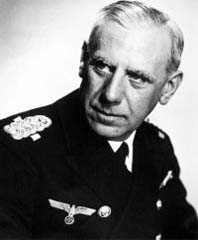
|
Carlson, Evans Fordyce (1896-1947), Brigadier-General, United States - American Marine Commander who had served two tours of duty in China during the 1920s and 30s and was ordered back there in 1937 to act as a military observer; an opportunity to watch Chinese Communist guerilla operations in Shensi province contributed to his interest in elinte commando units, later set out in recommendations made by him in 1941 for the formation of commando-type units within the Marine Corps; Despite the misgivings of some senior officers about the creation of an elite within what was anyway considered an elite corps, and the mistrust that some felt for his apparently uncritical view of the Chinese Communists, was given command of the 2nd Raider Battalion (Carlson's Raiders) with President Roosevelt's son Major James Roosevelt as his executive officer; following a reconnaissance mission on Makin Atoll in the Gilberts (August 1942), the Raiders landed on Guadalcanl in November, conducting a 150-mile patrol across difficult terrain and engaging the Japanese in over a dozen actions with minimal casualties to themselves; Though he ended the war as a Brigadier-General, was not given another command when his battalion was disbanded and sent as cadres to other units.
|

|
Carol II, King (1893-1957), Rumania - was the Hohenzollern King of Rumania before the war; was of German extraction, but favored alliance with Britain and France and on April 13, 1938 received a guarantee that Rumania's border would be defended by them; proclaimed himself dictator 3 months later; after the fall of Poland Rumania faced increasing pressure from both Germany and the Soviet Union; after Germany invaded France, declared himself in favor of the Axis and in June 1940 was forced by Hitler to cede Besserabia and northern Bukhovina to the USSR in order to keep the USSR out of the war; handed Transylvania over to Hungary in August and southern Dobruja to Bulgaria in September; because of these moves, became unpopular and on September 5, 1941 abdicated in favor of his son Michael and went into exile.
|

|
Cavallero, Count Ugo (1880-1943), Marshal, Italy - Chief of the Italian General Staff from 1940 to 1943; served in World War I, abandoning his military career after the war to work for the Pirelli Company until 1925, when appointed Under Secretary of War in Mussolini's government; succeeded Marshal Badoglio as Chief of Staff in November 1940, in the final stages of the dismal Italian campaign in Greece; an admirer of the efficiency of German war production and military structure, his appointement was at first regarded by Germany as a valuable one; comprehensively reorganized the leadership structure of the Italian Armed Fores, forged closer co-operation with the German High Command (OKW), pressed the Navy to take action in supplying Libya, and even used his industrial experience to influence the chaotic state of Italian war production; as C-in-C of Italian Forces in northeast Africa and head of Comando Supremo, disapproced of German General Rommel's aggressive strategies; as Axis fortunes turned in Africa and Italian casualties mounted, his reading of Italy's poor military situation added to rumors of a planned Fascist take over of the army, joined with other conspirators against Mussolini's regime; these rumors reached Mussolini who replaced Cavallero in January 1943 and ordered his arrest six months later; though released after the charge of conspiracy had been dropped, committed suicide in the knowledge that his involvement with the conspirators would shortly be made public.
|
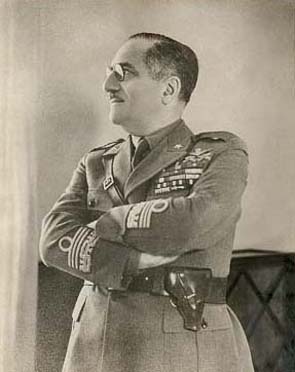
|
Chamberlain, Neville (1869-1940), Great Britain - British Conservative Prime Minister from 1937 to 1940, his name is now wholly identified with the policy of appeasement of the European dictators, in an attempt to maintain peace in Europe by concession; although he had enjoyed a high-level political career in which he had served as Minister of Health and Chancellor of the Exchequer, his political background and lack of knowledge of foreign affairs ill-equipped him to deal with the succession of political crises facing Europe during the late 1930s; in retrospect, the utter failure of Chamberlain's policy to safeguard peace or address the nature and balance of new forces in post-Versailles Europe seems in-build; under his leadership, Britain was clearly seen from a European perspective to align herself with the aggressor nations, Italy and Germany - Clement Attlee, leader of the Labor Party, bluntly described appeasement as 'policy of war' - and to abdicate her powerful position of diplomatic influence; between 1936 and 1939, he often ignored the advice of his foreign ministry officials, in sanctioning first Hitler's reoccupation of the Rhineland and Mussolini's expansionist activities in Abyssinia (1936), then the annexation of Austria by Germany and, most notoriously, Hitler's occupation of the Sudetenland in Czechoslovakia in 1938; even after the Anschluss, he appears to have been satisfied that he could assuage Hitler's appetite for the 'resolution of legitimate grievances' and ensure 'peace in our time' by conceding foreign territory to the Third Reich; the part he played in the immediate causes of war in Europe cannot be ignored; nevertheless, the urgent commitment to peace on which appeasement rested and the apparent moral blindness to the nature of Fascism in Europe and the unacceptable ideologies on which both Hitler's and Mussolini's foreign policies were based were certainly shared by many politicians and ordinary people both in Britain and in France during the period; following Hiterl's occupation of all of Czechoslovakia in March 1939, he finally abandoned appeasement and offered guarantees to Poland which led to Britain's declaration of war against Germany in September 1939, though he continued to dismiss the notion that Britain had submitted to total war; his poor handling of personal and political matters during the first winter of the war raised much criticism; the subsequent loss of parliamentary and public confidence in his authority and the need to coordinate efforts for the prosecution of the war were formalized in his resignation on May 10 and the creation of a national coalition government, with Winston Churchill at its head; he continued as Lord President, member of the War Cabinet and leader of the Conservative Party until shortly before his death in November 1940.
|

|
Chennault, Claire L. (1890-1958), Lieutenant General, United States - founder of the American Volunteer Group (Flying Tigers) in China and specialist in fighter tactics, served between the wars as chief of US Army Air Corps fighter training; in 1937 accepted an offer to train fighter pilots for the Chinese Government at an aviation school sponsored by Mme Chiang Kai-shek; recruiting pilots from the US, formed the Flying Tigers, China's only effective air arm, which he commanded until 1942, destroying and estimated 300 Japanese planes in the fighting over Burma, Indochina and China; though the Flying Tigers exacted heavy losses on Japanese squadrons and played an important part in the defense of the Burma Road, they were unable to halt the momentum of the Japanese offensive; the Burma Road was closed by the end of February 1942; recalled to active duty and promoted to Brigadier General, was given command of the China Air Task Force consisting at first of 34 Curtiss P-40 fighters and 7 B-25 medium bombers; pressed for an increase in China-based air power, which put him in direct opposition to General Joseph Stilwell, Chiang Kai-shek's American Chief of Staff, who favored a build-up of ground forces; by March 1943, the air strength in China had been build up sufficiently to be redesignated the 14th Air Force, functioning independently from USAAF units in India; became a Major General; B-24 heavy bombers were brought in and Chennault's highly skilled combat squadrons successfully harried Japanese aircraft over China, but supply difficulties in the remote theater of operations remained a significant disadvantage; in April 1944, a Japanese retaliatory operation (ICHI GO), provoked by 14th Air Force raids on Japanese shipping, resulted in the loss of his forward base at Kweilin; full air superiority in the theater was not achieved until the Japanese withdrew to coastal positions in May 1945; the frustration and difficulty of command in China, exacerbated by local logistical problems, was reflected in the continued bitterness of the clash between Chennault and Stilwell; when he resigned his command on July 6, 1945, in protest at the threatened disbandment of his Sino-American air force, Stilwell had already been recalled.
|

|
Chernyakhovsky, Ivan D. (1906-1945), General, Soviet Union - Soviet commander of the 3rd Tank Division at the time of the German invasion of Russia, distinguished himself early in the campaign during fighting at Novgorod, south of Leningrad; was appointed to command the 60th Army in July 1942 and fought in the Kursk offensive in early 1943; on Marshal Zhukov's recommendation, was then promoted general in command of the 3rd Belorussian Front and directed successful offensives against retreating German forces in Belorussia and East Prussia; was killed by artillery fire at Mehlsack near Königsberg in February 1945.
|
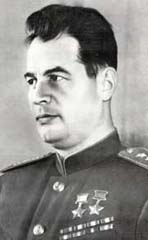
|
Chiang Kai-shek (1897-1975), China - Chinese nationalist general and President of China from 1943, was also Allied Supreme Commander of the China Theater of Operations from the outbreak of the Pacific War; having studied for a military career in China and Japan, served in the Japanese Army from 1909-11 before returning to China to support Sun Yat-sen's Kuomintang and aid him in his efforts to build up a republican army; When Sun died in March 1925, amid a struggle for the succession, he took over as C-in-C of the revolutionary army and began to consolidate his political position; a campaign against the Chinese warlords during 1926 was followed by a bloody coup in 1927 to outs the communists from the Kuomintang; by late 1928, with Nanking, Canton and Peking under his control, his power base was sufficiently consolidated to formalize his presidency - effectively a dictatorship - of the Chinese republic; continued to wage intermittent war against Chinese communists as well as against the Japanese after they occupied Manchuria in 1931; in addition, was also faced with 3 major army rebellions in 1930, 1933 and 1936; in December 1936, his kidnapping in Sian by rebel officers who were in contact with Chinese communists, involved Chou En-lai (one of Mao Tse-tung's principal advisers), in negotiations for a settlement of nationalist and communist conflicts; the resulting agreement to form a united front against Japanese encroachments on Chinese territory, however, provoked a swift reinforcement of Japanese military strength on Chinese frontiers; in July 1937 Japan launched a full-scale (though never formally declared) war against the Kuomintang which forced Chiang's withdrawal to a wartime capital at Chungking; thus, when in December 1941 Japan launched its attack against Pearl Harbor, he became an American ally, and US military and economic aid (already flowing since 1941 and December 1938 respectively) was stepped up; was also assigned an American Chief of Staff, Lt Gen Joseph Stilwell, at his own request; differences of opinion among the Western Allies about the potential contribution of Chiang's forces in the war effort, as well as the political complexities surrounding his position vis-à-vis the Chinese communists, overshadowed relations and much of the fighting in the China-Burma theater until the end of the war; in particular, his developing feud with Stilwell, who disparagingly nicknamed him 'Peanut', received considerable publicity, and finally resulted in Stilwell being recalled to the US in 1944; as the end of the war approached, talks between him and communist leader Mao Tse-tung failed to avert outbreaks of fighting between nationalist and communist army brigades; by 1947, China was again engaged in all-out civil war, and Chiang was eventually forced to abandon his position in the Kuomintang; in March 1950, now established on Formosa (Taiwan) with many of his supporteds, he formally resumed the presidency and continued to hope for US military backing for a return to mainland China; remained as president in Formosa until his death, overseeing the new prosperity developing in Taiwan from its strong economic links with Japan and the US.
|

|
Chuikov, Vasily I. (1900- ), General, Soviet Union - highly able Soviet general who directed the defense of Stalingrad from September to November 1942, had served in the occupation of eastern Poland, the Russo-Finnish War and as an adviser to Chiang Kai-shek in Chungking, before being appointed to command the 62nd Army from May 1942; although the German siege of Stalingrad devastated the city and had to be resisted in house-to-house fighting at enormous cost on both sides, his tactic of fighting from isolated pockets of resistance exhausted the resources of the German 6th Army under von Paulus, enabling a Soviet counteroffensive to be launched for the recapture of the city on November 19; subsequently commanded the 8th Guards Army on the Belorussian Front and spearheaded the final offensive against Berlin; under Khrushchev, served as C-in-C of Soviet Military Forces in Germany (1949-1953).
|
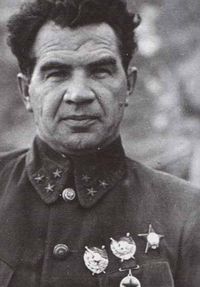
|
Churchill, Winston (1874-1965), Great Britain - son of an English father and an American mother; was a war correspondent, member of Parliament and World War I cabinet member; in the 1930s was almost the sole voice warning his country of the danger of Nazi Germany; denounced the appeasement of the Munich Pact of 1938; kept out of the government because of his unpopular views; when war broke out in 1939 returned to government and became First Lord of the Admiralty; succeeded Chamberlain as prime minister in May 1940; during the dark days of the Battle of Britain, his stirring speeches and stubborn courage inspired his people to carry on their fight against Germany; during the war, was one of a triumvirate that included Roosevelt and Stalin, which shaped the Allied victory; in July 1945, an electorate exhausted by war and eager to improve living conditions at home turned Churchill's party out of office; named prime minister once again during the postwar period (1951-55) and is remembered as the outstanding statesman of the 20th century.
|

|
Ciano, Count Galeazzo (1903-1944), Italy - Mussolini's Foreign Minister from 1936-44; was an ambitious convert to Italian Fascism and a participant in the Fascist March on Rome in 1922; held various diplomatic posts during the 1920s and subsequently guaranteed his career by marrying Mussolini's daughter, Edda, in 1930; firmly advocated an alliance between the two major Fascist powers; signed the Berlin-Rome Axis in October 1936 which appeared to cement his ambitions for the recognition of Italian power in Europe; agreement was breached when Germany initiated action against Poland without informing Italy; in an attitude reversal, attempted to persuade Mussolini to disentangle himself from Hitler, but events of 1940 overtook that; Italy entered the was as Germany's ally on June 10, 1940; was clearly more able than Mussolini tho analyze the course of the war and predict the outcome for Italy; the halting of the Germans before Moscow and the US declaration of war in December 1941 convinced him of the need to make a separate peace with the Allies; resigned in Februrary 1943 and was exiled to the Vatican; remaining a member of the Fascist Grand Council, participated in the decision to depose Mussolini in mid-1943 and to call on Marshal Badoglio to form a new government; denounced by the new government in Rome on charges of corruption, was arrested by supporters of Mussolini, sentenced to death at Verona and executed January 11, 1944.
|
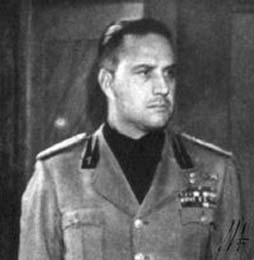
|
Clark, Joseph (1893-1971), Rear Admiral, United States - colorful commander of the American carrier Yorktown and later commander of Task Group 58, one of the fast carrier task forces whose striking power played a major part in the operations against the 'Jimas', the Battle of the Philippine Sea, the capture of Okinawa and the attacks on the Japanese home islands; after the war served as Assistant Chief of Naval Operations.
|
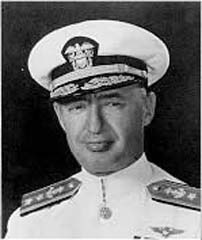
|
Clark, Mark W. (1896-1983), General, United States - charismatic US general nicknamed 'the American Eagle' by Churchill and widely regarded as a highly effective field commander; was a West Point graduate who served in World War I and began World War II as a staff officer of Army ground forces; his commitment, ambition and leadership qualities saw him quickly promoted to Chief of Staff, Commander of II Corps, and then deputy to C-in-C Eisenhower for the TORCH invasion of North Africa in November 1942; was responsible for handling the difficult secret negotiations with French officers over the planning and coordination of the TORCH landings in North Africa; immediately preceding the landings, was landed off Algiers by submarine to make contact with Admiral Darlan, finally securing an armistice with French North African forces 3 days later, although the involvement with Darlan subsequently caused the Allies significant political embarrassment; in January 1943, now a Lt General, was given command of the US 5th Army, then a training organization, which was assigned to participate in the Allied invasion of Italy; commanded the landings at Salerno on September 9, 1943, beginning the long campaign in which he gained his reputation as a battlefield commander; fighting against an exceptional German defense directed by Field Marshal Kesselring and over terrain which largely favored the defenders, commanded 5th Army operations (including the unsuccessful Anzio operation) in the face of political as well as military difficulties; forcing a slow passage up the toe onto the leg of the Italian mainland, his supply and reinforcement (like Montgomery;s, in command of the British 8th Army) was increasingly subject to the vacillations and disagreements among the Allied leaders and Combined Chiefs of Staff over the status and objectives of the Allied campaign in Italy; Criticism of Clark's leadership of the 5th Army, notably in the winter of 1943-4 and at the Rapido River battles, should perhaps take into account the significant difficulties of command posed by thse factors; following the costly Anzio operations and his opportunistic capture of Rome with the 5th Army, in June 1944, continued to apply himself energetically to success in Italy, despite the drain of men and equipment imposed by the Allied decision to invade Northwest Europe; from late 1944, commanding the 15th Army Group, one of the most heterogeneous field armies of the war (it include American, British, Italian, French, Polish, Brazilian, New Zealand, African, Canadian and Palestinian troops), directed the gruelling advance of his armies up the narrow Italian peninsula, before accepting the surrender of German forces in Italy under von Vietinghoff (Kesselring's successor) and SS General Wolff, on May 2, 1945); now a full general, was subsequently posted to Austria to command US forces of occupation there; afterwards, commanded the 6th Army and, later, UN forces in Korea; in July 1953 was a signatory of the truce in Korea.
|

|
Collins, Joseph Lawton(1896-1987), Lieutenant General, United States - aggressive and able commander of the US Army VII Corps, which fought at Guadalcanal and went ashore at Utah Beach, Normandy on D-Day, fighting through the remainder of the campaign in Europe; initially sent to Hawaii as Chief of Staff of VII Corps, to reorganize its defenses after Pearl Harbor, then replaced General Vandegrift as commander of the 25th Inf Div on Guadalcanal, where he earned the nickname 'Lightning Joe' for his aggressive pursuit of the enemy; in February 1944, assumed command of VII Corps, and lead the breakout from the Normandy beachhead; successful operations at Argentan-Falaise, Cherbourg, St Lo, Namur and Aachen - and later Cologne, Remagen and the Ruhr pocket - earned him the deep respect of Allied commanders in the theater; was promoted to Lieutenant General in April 1945.
|

|
Compton, Arthur (1892-1962), United States - American physicist, Nobel Prize winner in 1927, and a leading figure in the development of the first nuclear weapons; headed the department at the University of Chicago which created the first atomic pile in 1941, became an important member of the Manhattan Engineer Project and directed research into the use of man-made plutonium to create nuclear fission; in 1945 became President of Washington University, St Louis.
|
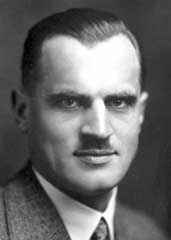
|
Crerar, Henry (1888-1965), General, Canada - distinguished and highly able Canadian commander of the Canadian 1st Army which fought throughout the Allied campaign in Northwest Europe during 1944-5; a vociferous opponent of Canadian isolationism and promoter of programs for the development of Canadian forces based in Britain, resigned as Chief of the General Staff in 1941 to organize the UK training of 100,000 Canadians of the 1st Canadian Corps; following active service with the Corps in Sicily and Italy, returned to Britain to form the Canadian 1st Army (which at times included also Dutch, Polish, Belgian, US, British and Czech elements) for hte invasion of Normandy in June 1944; after directing the battle at Argentan-Falaise and fighting in the Pas de Calais, the Scheldt and in the Netherlands, took tommand of the bulk of the 21st Army Group forces (over 500,000 men) for the offensive against the Lower Rhine, begun in February 1945; retired in 1946.
|

|
Cripps, Sir Stafford (1889-1952), Great Britain - British Socialist and Labor Party politician; had resigned from the Party in protest at Labor's accession to Chamberlain's policy of appeasement of the European dictators, but was recalled by Churchill to lead a mission to Moscow in 1940; also led the unsuccessful British mission to India in 1942 to win Indian support for the Allied war effort, in return for promises of full autonomy after the war; on his return to Britain, briefly held a post in the War Cabinet before becoming Minister of Aircraft Production; in July 1945 becam Chancellor of the Exchequer in Attlee's post-war Cabinet.
|

|
Cunningham, Sir Alan (1887-1983), General, Great Britain - the younger brother of Admiral Sir Andrew Cunningham, commanded British forces in Kenya in 1940-41; after leading the successful invasion of Italian Somaliland and Ethiopia, was transferred to the Western Desert in August 1941 to command the 8th Army; replaced 3 months later by Lt-Gen Ritchie after a lack-luster performance in the opening stages of Operation Crusader; spent the rest of the war in home commands.
|

|
Cunningham, Sir Andrew (1883-1963), Admiral, Great Britain - the star among Britain's wartime naval leaders, took command of the Mediterranean Fleet (the Royal Navy's most important overseas force) in 1939; a highly successful destroyer captain in World War I, his approach to high command contrasted aggressively with that of his Italian counterparts; vastly outnumbered by the Italian Navy after June 1940, immediately went onto the offensive; using the advantages at his disposal - superior combat expertise, radar, acurate intelligence and naval aviation - followed a seried of coastal bombardment operations with successful attacks on Italian warships at Taranto and Cape Matapan, establishing a dominance over Italain surface forces that he never lost; from 1941 the Lufwaffe was a more dangerous threat, inflicting enormous losses on Cunningham's fleet in operations around Greece and Crete, while multiplying the threat to British convoy routes; his effective concentrations of his dwindling resources and imaginative tactical deployments helped his battered ships to maintain supplies to Malta and North Africa, while inflicting significant losses on convoys destined for the Afrika Korps; the fate of Malta and the 8th Army in Africa hung in the balance when he left the Meditarranean in June 1942 for discussions with the Combined Chiefs of Staff in Washington; returned in November as C-in-C of a far larger Anglo-American fleet covering the TORCH landings in Northwest Africa; by May 1943, when fighting ended in Africa, naval superiority had been established in the
Mediterranean and was responsible for the planning and execution of the amphibious landings in Sicily and Italy from his headquarters on Malta; in October 1943, following the death of Sir Dudley Pound, was appointed First Sea Lord, the highest position in the Royal Navy, and was Churchill's principal naval strategist for the remainder of the war; retired in June 1946.
|
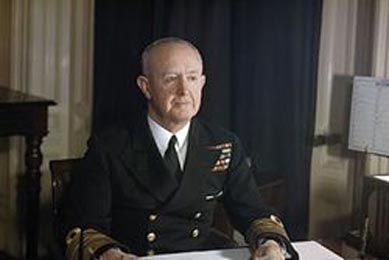
|
Curtin, John (1885-1945), Australia - Australian Prime Minister from October 1941 until his death; a lifelong pacifist, had become leader of the Labor Party in 1935, and took power from Arthur Fadden's short-lived United Australian Party government in an atmosphere of disillusion over Britain's treatement of Australian interests since the start of the war; when Japan entered the conflict weeks later, he asked the United States for aid and backed this with an Australian declaration of war which was separate from Britain's; remained loyal to the British Commonwealth but argued forcefully that this alone could not stop the Japanese; mistrusted in London, nevertheless sought to balance British and American interests in Australia; in 1942 Australia was desperately short of troops for home defense and Curtin recalled units of the Australian Army from the Middle East, refusing Churchill's request to divert them to Burma; in March General Douglas MacArthur became Supreme Commander of the newly activated Southwest Pacific Area, which included Australia; inexperienced in military planning and anxious to retain American sympathy, consistently allowed MacArthur unchallenged control over Australian military strategy; later in the war, however, pressed for a strong British naval presence in the Far East to counterbalance US influence in the area; until the general election of 1943, his government was in constant danger of defeat, and not until after his landslide victory was he able to risk personal appearances at major conferences abroad; was meanwhile represented in London by his able and aggressive Minister for External Affairs, Herbert Evatt, whose avowed concern for Australian rather than Imperial interests did not endear him to his colleagues in the British War Cabinet; attended the London conference of Empire Prime Ministers in May 1944, and reaffirmed his faith in the commonwealth; during his journey home, a fatal illness developed and his health kept him from further involvement in international affairs; died on July 5, 1945, 5 weeks before the end of the Pacific War.
|

|



















